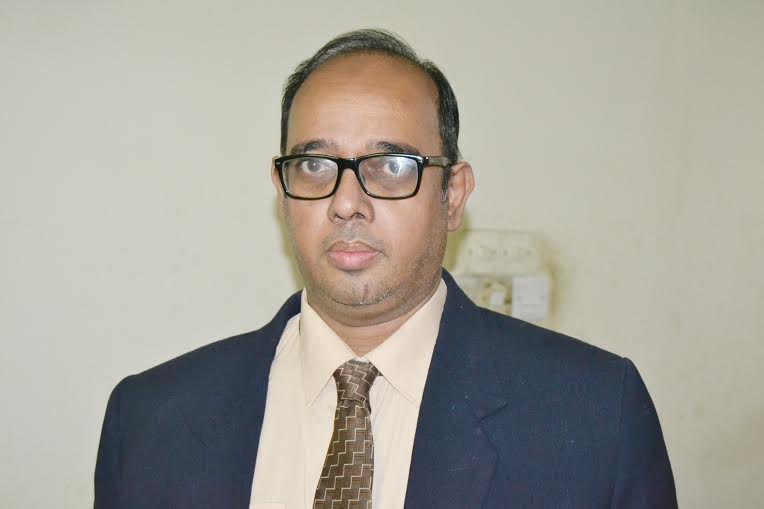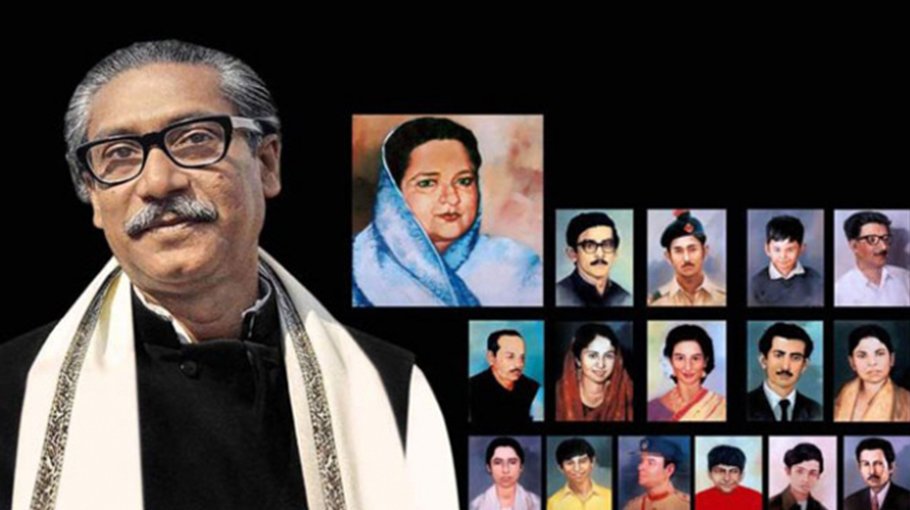Tragic death of Bangabandhu Sheikh Mujibur Rahman

Bangabandhu had to face immense torture in the West Pakistan prisonand they tried to break his nerve, but he was so self-determined that he did not bow down and his firm mental strength remained ever fresh. Under his able leadership Bangladesh became independent on 16th December, 1971. He never bowed down in the Pakistan jail. Mujib returned to Bangladesh on 10 January, 1972 as world pressure was mounting on Pakistanis to release him.
Mujib served as the first President of the Bangladesh from 1971 to 12 January 1972 and again from 25 January 1975 to 15 August 1975 until he was killed by the miscreants. However, during the independence war he was the president in absentia. He served as the Prime Minister of Bangladesh from 12 January 1972 to 25 January 1975.
Six-point demands were placed by Mujib on February 5, 1966 at Lahore of Pakistan which was actually beneficial for this part of the region. Mujib, by providing six points demand tried to deem in “non-violence" movement and sought a bloodless, calm-composite and autonomous clarification to attain unconditional sovereignty. It was the starting point to gradually overthrow second colonial era during Pakistani period.
Mujibur Rahman had involved himself in structuring a comprehensive education scheme in assessment of the socio-economic and political scenario of the country during the post-independence period. As per his directives, 'Qudrat-e-Khuda commission' had given its report to the then government on May 30 in 1974 to modernize the country’s education system. But after the sad demises of Mujib, educational policy did not properly function which ultimately could not help to attain demographic dividend. Mujib made some innovative deviations in the production of medicines in the war-torn country and gave priority for the treatment of wounded freedom fighters. He tried to curtail high population growth by establishing family planning in the year 1973.
During his regime, he tried his best to develop the country in different aspects. Almost 98 per cent banks, insurance companies, and industries were owned by the West Pakistanis, he nationalized them. For smooth progression of the monetary policy Bangabandhu took different initiatives. He established central bank of the country on 25th March,1972 to channel saving and investment. He set up Bangladesh Krishi Bank for agricultural development and for development of industrial sector he established Bangladesh Shilpa Bank and Bangladesh Shilpa Rin Sangshta. He tried to develop the fiscal policy through initiating development programs. The first national budget for the 1972-73 fiscal year was total amount of Bangladesh taka Tk 786 Crore. Main motto of the budget was to remove income inequality creation and to attain social justice.
First Five-Year plan of Bangladesh unveiled for the period of 1973-78 with the amount of Bangladesh Taka 4,455 crore. The main motto of the plan was to reduce poverty, boost the GDP growth to 5.5 percent per annum and per capita income at the rate of 2.5 percent per annum. He tried to develop skilled human force and business personnel. He wanted to provide equal opportunity for the society. Bangabandhu followed the path of the Meiji Era of Japan who ruled for the 44 years’ time period from the year 1868 to 1912. He wanted to protect humanity by removing dishonesty, violence, oppression and corruption. The constitution came into effect on 16 December, 1972 which acknowledged nationalism, socialism, democracy and secularism as the basic main beliefs of the nation. His regime for the period of three years and a half wherein he tried to establish a classless society. The country was war damaged; disruption of all sorts of transportation including road, rail and river. Initially from scratch his government worked hard to combat the innumerable troubles of a battle devastated state and to bring normalcy. Re-establishment of law and order, rehabilitate the war victims, bringing restoration of the communication system, and feeding the hungry. Cores of people and many others affected due to war were slowly getting benefits through his proper management and administrative rules. Under his magnetic guidance Bangladesh achieved respect from the other countries as well as from the United Nations. As Agarwal (2015) described that building up of your own credibility is a big step in getting people in your side-Bangabandhu long before exercised it for the well-being of the country people.
Mujib's zeal and dedication was for the social welfare of the human beings with scarce resources. Mujib tried to develop the financial system to remove stagnancy in a war trodden country through establishing production by capacity building. The prices of necessity products were gradually decreasing. Imbued with hope, people came forward to help to reach the benefits of independence to every doorstep. Creation of a sovereign nation, nine months of civil war and genocide; the humanitarian needs were infinite, and Mujib responded generously and acted with true spirit of a benevolent ruler with kind heart. He worked for blue economy, gas and petroleum, aviation and aerospace. He was conscious about eco-friendly environment practices and he wanted to develop tourism sector. Bangabandhu’s foreign policy was based on promotion of international peace, security and solidarity.
On 21 June 1975, by a presidential ordinance, Sheikh Mujibur Rahman created 61 districts from the existing 19. The governor-designates for the 61 districts were declared on 16 July of the same year. Second revolution was a political hypothesis included a sequence of restructuring in the three pillars of a state: administrative, judiciary and legislative method. BAKSAL (Bangladesh Krishak Sramik Awami League) was created with the aim of removing disparity, creating equal opportunities for all segments of the people of the country and create a classless society which was free from bureaucratic mannerism. BAKSAL can be compared with MEIJI restoration of 1868 in Japan. Unfortunately, traitors and conspirators did not give this great human being a chance to serve the nation too long as they killed him and his family members tragically. Now after his tragic death we feel that he is stronger than before.
However, in the early morning on15 August, 1975 the noblest and greatest of Bangles with his wife Bangamata Sheikh Fazilatunnesa Mujib and other family members and relatives were killed by the anti-independence Bangladesh force.
The sad death of this political giant created a vacuum which can never be filled up as the character of politics is now becoming complex and different. Citizens of this country are now upright, privileged, elevated and delighted since independence earned by this patriotic leader Mujib with his super goal to ensure welfare of the citizens of the country. By learning and matching the qualities and thoughts of the great leader of the Bangladesh - Sheikh Mujibur Rahman, now time has come- the nation can be modified to fulfill criteria of welfare state for the public through arranging fairness of chances, unbiased distribution of wealth, and carrying with public responsibilities. His daughter fourth time Prime Minster of the country is now working hard following his path though the road is not so smooth as still conspirators are trying to create problems. Mujib exercised uncompromising practicality, which is good for us, the pro- people-oriented leadership with emotional and social intelligence and elegance of transformations of thought and method that discovers a symmetry between practicality and idealism. The present government is trying to improve the economic scenario of the country with utmost care. But those who are evil they must be punished without any sort of hesitation and conspirators should be strongly handled. Those who are land grabbers, they must be severely penalized despite their party affiliation. Another humble suggestion is to the policy makers that to set up a societal banking system as per his ideology and also his daughter’s philosophy for the poor income strata people of country through channeling between micro savings and micro investments especially for the poor and down trodden people of the society under separate regulator. Airports in the Cumilla, Thakurgaon, Lalmonirhat and another airport near Padma River bank should be setup as early as possible under current eight five-year planning of the country. Train line through directly from Cumilla via gomati, meghna and Narayanganj directly to Dhaka needs to be set up for expediting decrease of high population density of Dhaka city. Moreover, special emphasis needs to be given on growth with equity when the country is passing through fourth industrial revolution as well as impact of COVID 19.
Bangabandhu always wanted those who are corrupt to get a penalty for their misdeed. He is also considered a magnetic leader as people always want to follow his decisions and tried to implement them. Bangabandhu’s ideology is a continuous source of inspiration for Bengalis which includes working with honesty, devotion, secularism. removing disparity, gender balances, against any sort of repression and to attain improvement of livelihood. This in turn will help us demonstrate genuine respect to the memory of him. Mujib is also one of the political philosophers whose ideology is still valid for human progress and capacity building for organizations. Tragic death of Bangabandhu was a great loss for Bangladesh as he always worked for the country.
The author is a Professor of Economics, IT, Finance and Entrepreneurship. He is ex Vice Chancellor of Presidency University.



